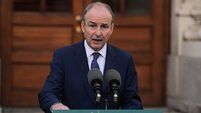Elaine Loughlin: College fees could be the snag that will unravel an already fractious Coalition

With the two main Government parties parties eyeing each other with increasing distrust, Tánaiste Simon Harris ignited tensions by wading into the student fees issue, compounded by James Lawless taking to the airwaves.
The student fees budget row may be just the beginning of an unravelling of an ineffective Coalition.















